ISYS100 Essay: Analyzing Facebook & Google's Data Mining Practices
VerifiedAdded on 2023/06/11
|16
|4344
|148
Essay
AI Summary
This essay explores the ethical implications of data mining practices by Facebook and Google, questioning whether these organizations can be solely blamed for data mining when users willingly share information online. It examines the role of social media platforms in collecting and utilizing user data for targeted advertising and other purposes, highlighting the Cambridge Analytica scandal as a significant breach of user privacy. The essay also discusses the responsibility of users to carefully review privacy settings and terms of service before sharing their information, suggesting that a joint effort between companies and users is necessary to protect data from fraudulent activities. Ultimately, the essay argues that while data mining raises privacy concerns, Facebook and Google should not be entirely held accountable, as they provide platforms for users to make informed decisions about data sharing.
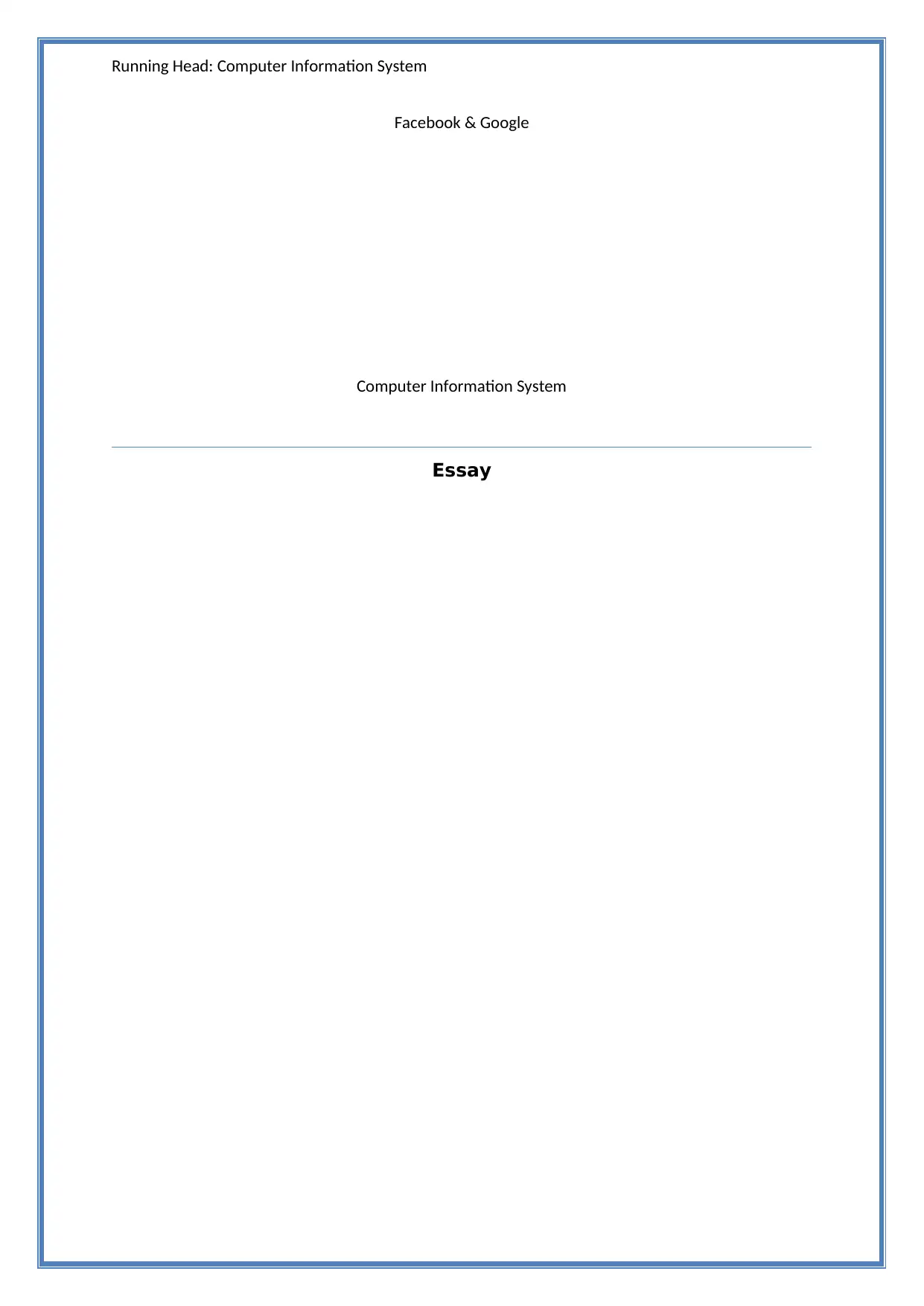
Running Head: Computer Information System
Facebook & Google
Computer Information System
Essay
Facebook & Google
Computer Information System
Essay
Paraphrase This Document
Need a fresh take? Get an instant paraphrase of this document with our AI Paraphraser
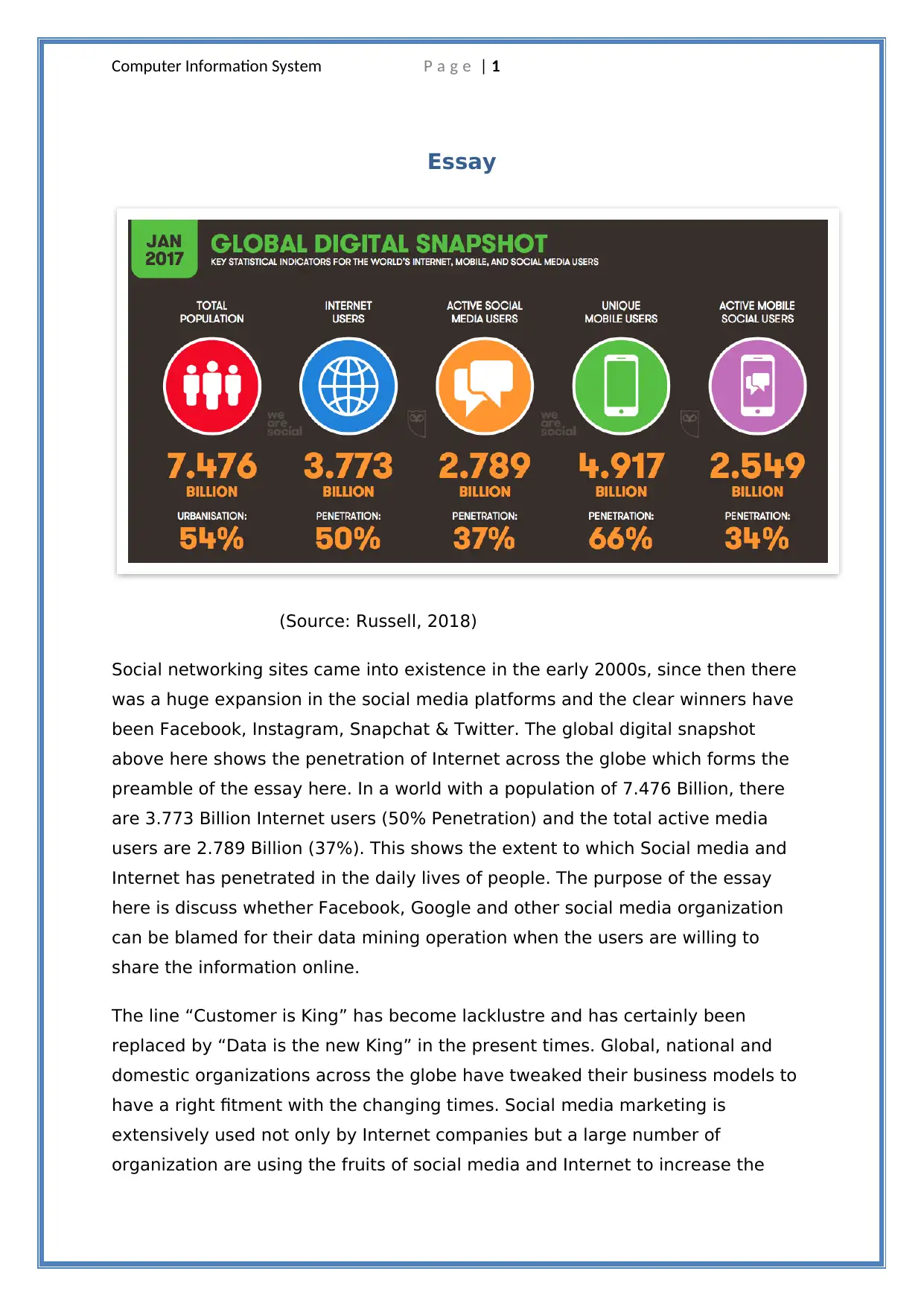
Computer Information System P a g e | 1
Essay
(Source: Russell, 2018)
Social networking sites came into existence in the early 2000s, since then there
was a huge expansion in the social media platforms and the clear winners have
been Facebook, Instagram, Snapchat & Twitter. The global digital snapshot
above here shows the penetration of Internet across the globe which forms the
preamble of the essay here. In a world with a population of 7.476 Billion, there
are 3.773 Billion Internet users (50% Penetration) and the total active media
users are 2.789 Billion (37%). This shows the extent to which Social media and
Internet has penetrated in the daily lives of people. The purpose of the essay
here is discuss whether Facebook, Google and other social media organization
can be blamed for their data mining operation when the users are willing to
share the information online.
The line “Customer is King” has become lacklustre and has certainly been
replaced by “Data is the new King” in the present times. Global, national and
domestic organizations across the globe have tweaked their business models to
have a right fitment with the changing times. Social media marketing is
extensively used not only by Internet companies but a large number of
organization are using the fruits of social media and Internet to increase the
Essay
(Source: Russell, 2018)
Social networking sites came into existence in the early 2000s, since then there
was a huge expansion in the social media platforms and the clear winners have
been Facebook, Instagram, Snapchat & Twitter. The global digital snapshot
above here shows the penetration of Internet across the globe which forms the
preamble of the essay here. In a world with a population of 7.476 Billion, there
are 3.773 Billion Internet users (50% Penetration) and the total active media
users are 2.789 Billion (37%). This shows the extent to which Social media and
Internet has penetrated in the daily lives of people. The purpose of the essay
here is discuss whether Facebook, Google and other social media organization
can be blamed for their data mining operation when the users are willing to
share the information online.
The line “Customer is King” has become lacklustre and has certainly been
replaced by “Data is the new King” in the present times. Global, national and
domestic organizations across the globe have tweaked their business models to
have a right fitment with the changing times. Social media marketing is
extensively used not only by Internet companies but a large number of
organization are using the fruits of social media and Internet to increase the
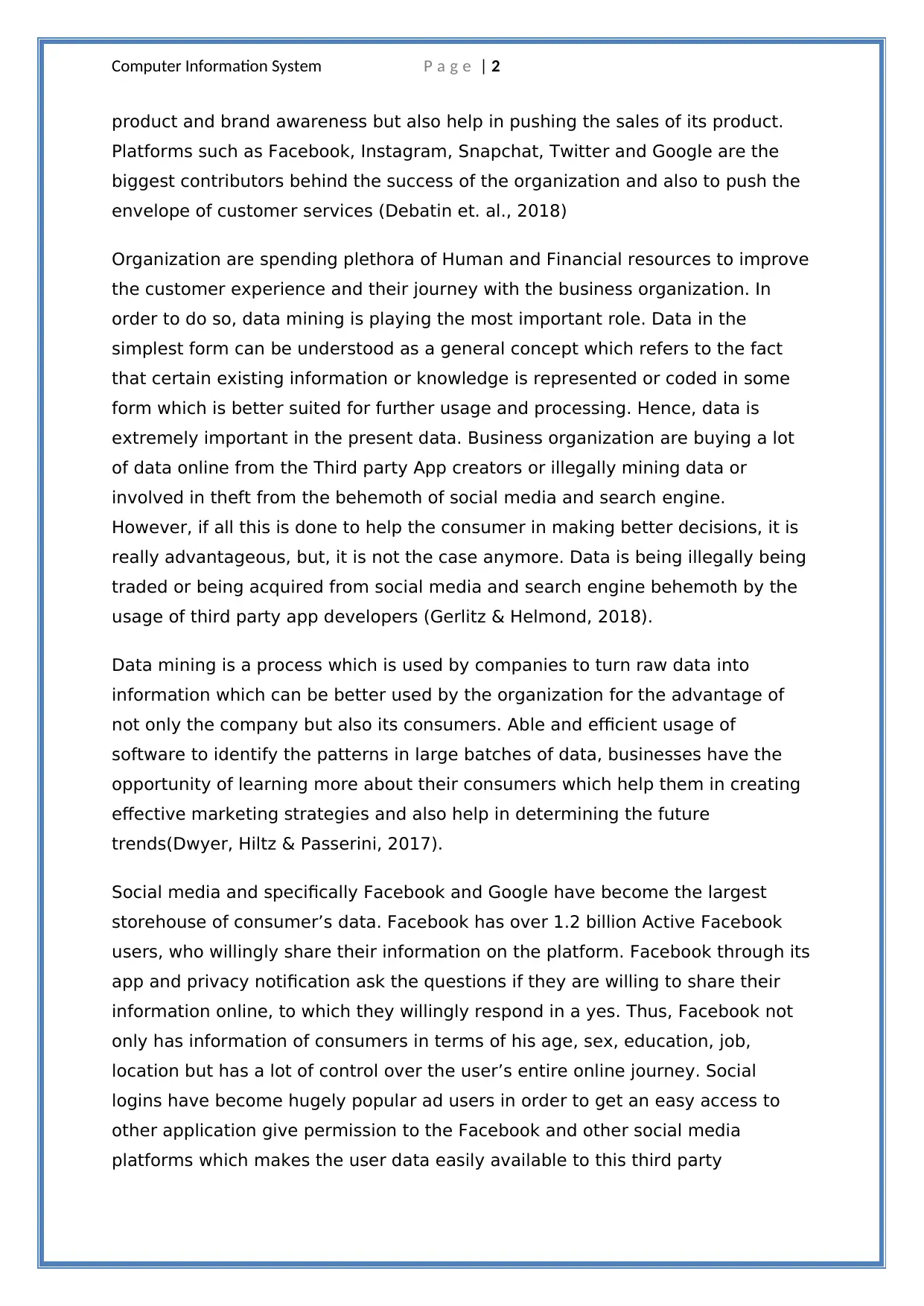
Computer Information System P a g e | 2
product and brand awareness but also help in pushing the sales of its product.
Platforms such as Facebook, Instagram, Snapchat, Twitter and Google are the
biggest contributors behind the success of the organization and also to push the
envelope of customer services (Debatin et. al., 2018)
Organization are spending plethora of Human and Financial resources to improve
the customer experience and their journey with the business organization. In
order to do so, data mining is playing the most important role. Data in the
simplest form can be understood as a general concept which refers to the fact
that certain existing information or knowledge is represented or coded in some
form which is better suited for further usage and processing. Hence, data is
extremely important in the present data. Business organization are buying a lot
of data online from the Third party App creators or illegally mining data or
involved in theft from the behemoth of social media and search engine.
However, if all this is done to help the consumer in making better decisions, it is
really advantageous, but, it is not the case anymore. Data is being illegally being
traded or being acquired from social media and search engine behemoth by the
usage of third party app developers (Gerlitz & Helmond, 2018).
Data mining is a process which is used by companies to turn raw data into
information which can be better used by the organization for the advantage of
not only the company but also its consumers. Able and efficient usage of
software to identify the patterns in large batches of data, businesses have the
opportunity of learning more about their consumers which help them in creating
effective marketing strategies and also help in determining the future
trends(Dwyer, Hiltz & Passerini, 2017).
Social media and specifically Facebook and Google have become the largest
storehouse of consumer’s data. Facebook has over 1.2 billion Active Facebook
users, who willingly share their information on the platform. Facebook through its
app and privacy notification ask the questions if they are willing to share their
information online, to which they willingly respond in a yes. Thus, Facebook not
only has information of consumers in terms of his age, sex, education, job,
location but has a lot of control over the user’s entire online journey. Social
logins have become hugely popular ad users in order to get an easy access to
other application give permission to the Facebook and other social media
platforms which makes the user data easily available to this third party
product and brand awareness but also help in pushing the sales of its product.
Platforms such as Facebook, Instagram, Snapchat, Twitter and Google are the
biggest contributors behind the success of the organization and also to push the
envelope of customer services (Debatin et. al., 2018)
Organization are spending plethora of Human and Financial resources to improve
the customer experience and their journey with the business organization. In
order to do so, data mining is playing the most important role. Data in the
simplest form can be understood as a general concept which refers to the fact
that certain existing information or knowledge is represented or coded in some
form which is better suited for further usage and processing. Hence, data is
extremely important in the present data. Business organization are buying a lot
of data online from the Third party App creators or illegally mining data or
involved in theft from the behemoth of social media and search engine.
However, if all this is done to help the consumer in making better decisions, it is
really advantageous, but, it is not the case anymore. Data is being illegally being
traded or being acquired from social media and search engine behemoth by the
usage of third party app developers (Gerlitz & Helmond, 2018).
Data mining is a process which is used by companies to turn raw data into
information which can be better used by the organization for the advantage of
not only the company but also its consumers. Able and efficient usage of
software to identify the patterns in large batches of data, businesses have the
opportunity of learning more about their consumers which help them in creating
effective marketing strategies and also help in determining the future
trends(Dwyer, Hiltz & Passerini, 2017).
Social media and specifically Facebook and Google have become the largest
storehouse of consumer’s data. Facebook has over 1.2 billion Active Facebook
users, who willingly share their information on the platform. Facebook through its
app and privacy notification ask the questions if they are willing to share their
information online, to which they willingly respond in a yes. Thus, Facebook not
only has information of consumers in terms of his age, sex, education, job,
location but has a lot of control over the user’s entire online journey. Social
logins have become hugely popular ad users in order to get an easy access to
other application give permission to the Facebook and other social media
platforms which makes the user data easily available to this third party
⊘ This is a preview!⊘
Do you want full access?
Subscribe today to unlock all pages.

Trusted by 1+ million students worldwide
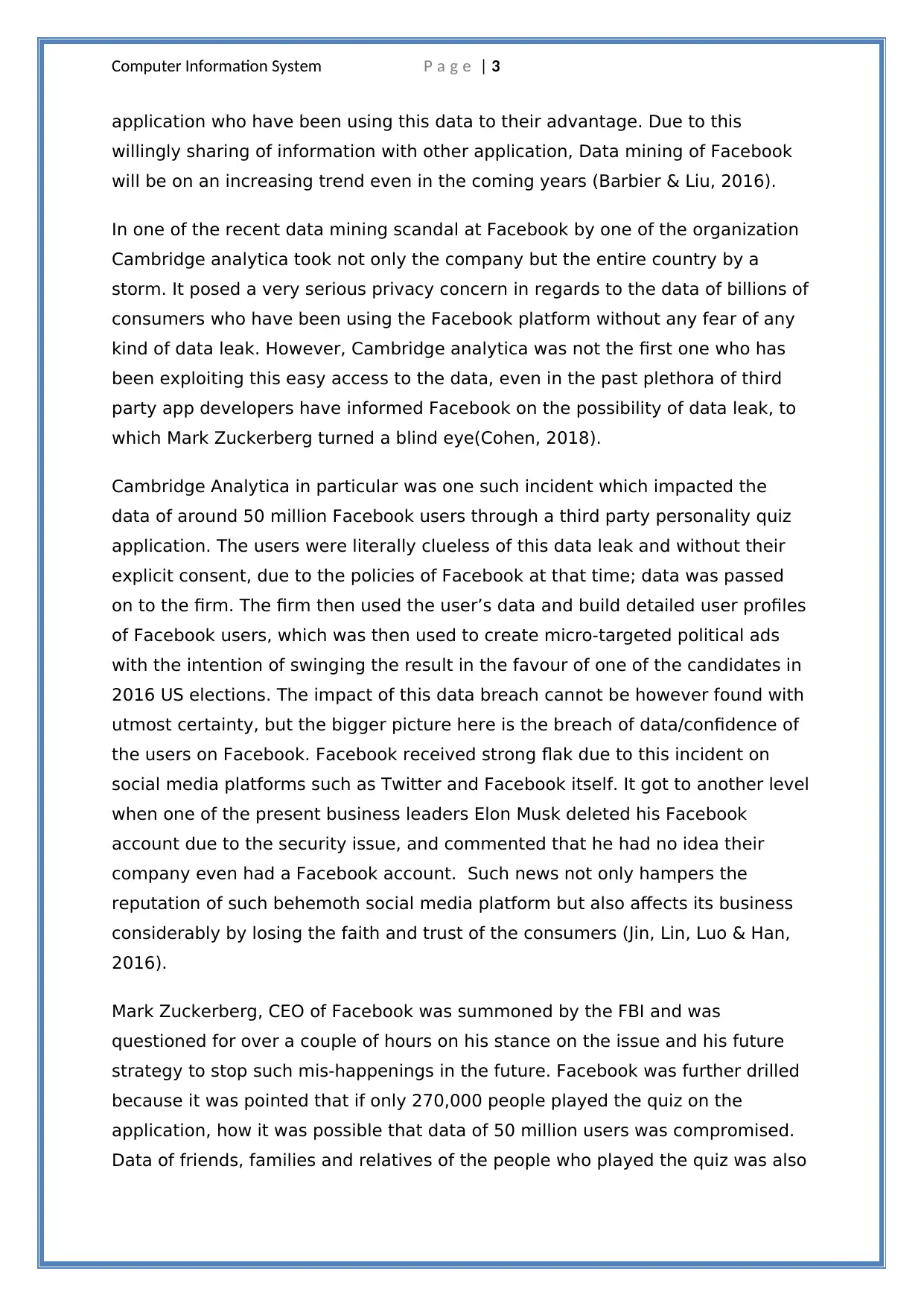
Computer Information System P a g e | 3
application who have been using this data to their advantage. Due to this
willingly sharing of information with other application, Data mining of Facebook
will be on an increasing trend even in the coming years (Barbier & Liu, 2016).
In one of the recent data mining scandal at Facebook by one of the organization
Cambridge analytica took not only the company but the entire country by a
storm. It posed a very serious privacy concern in regards to the data of billions of
consumers who have been using the Facebook platform without any fear of any
kind of data leak. However, Cambridge analytica was not the first one who has
been exploiting this easy access to the data, even in the past plethora of third
party app developers have informed Facebook on the possibility of data leak, to
which Mark Zuckerberg turned a blind eye(Cohen, 2018).
Cambridge Analytica in particular was one such incident which impacted the
data of around 50 million Facebook users through a third party personality quiz
application. The users were literally clueless of this data leak and without their
explicit consent, due to the policies of Facebook at that time; data was passed
on to the firm. The firm then used the user’s data and build detailed user profiles
of Facebook users, which was then used to create micro-targeted political ads
with the intention of swinging the result in the favour of one of the candidates in
2016 US elections. The impact of this data breach cannot be however found with
utmost certainty, but the bigger picture here is the breach of data/confidence of
the users on Facebook. Facebook received strong flak due to this incident on
social media platforms such as Twitter and Facebook itself. It got to another level
when one of the present business leaders Elon Musk deleted his Facebook
account due to the security issue, and commented that he had no idea their
company even had a Facebook account. Such news not only hampers the
reputation of such behemoth social media platform but also affects its business
considerably by losing the faith and trust of the consumers (Jin, Lin, Luo & Han,
2016).
Mark Zuckerberg, CEO of Facebook was summoned by the FBI and was
questioned for over a couple of hours on his stance on the issue and his future
strategy to stop such mis-happenings in the future. Facebook was further drilled
because it was pointed that if only 270,000 people played the quiz on the
application, how it was possible that data of 50 million users was compromised.
Data of friends, families and relatives of the people who played the quiz was also
application who have been using this data to their advantage. Due to this
willingly sharing of information with other application, Data mining of Facebook
will be on an increasing trend even in the coming years (Barbier & Liu, 2016).
In one of the recent data mining scandal at Facebook by one of the organization
Cambridge analytica took not only the company but the entire country by a
storm. It posed a very serious privacy concern in regards to the data of billions of
consumers who have been using the Facebook platform without any fear of any
kind of data leak. However, Cambridge analytica was not the first one who has
been exploiting this easy access to the data, even in the past plethora of third
party app developers have informed Facebook on the possibility of data leak, to
which Mark Zuckerberg turned a blind eye(Cohen, 2018).
Cambridge Analytica in particular was one such incident which impacted the
data of around 50 million Facebook users through a third party personality quiz
application. The users were literally clueless of this data leak and without their
explicit consent, due to the policies of Facebook at that time; data was passed
on to the firm. The firm then used the user’s data and build detailed user profiles
of Facebook users, which was then used to create micro-targeted political ads
with the intention of swinging the result in the favour of one of the candidates in
2016 US elections. The impact of this data breach cannot be however found with
utmost certainty, but the bigger picture here is the breach of data/confidence of
the users on Facebook. Facebook received strong flak due to this incident on
social media platforms such as Twitter and Facebook itself. It got to another level
when one of the present business leaders Elon Musk deleted his Facebook
account due to the security issue, and commented that he had no idea their
company even had a Facebook account. Such news not only hampers the
reputation of such behemoth social media platform but also affects its business
considerably by losing the faith and trust of the consumers (Jin, Lin, Luo & Han,
2016).
Mark Zuckerberg, CEO of Facebook was summoned by the FBI and was
questioned for over a couple of hours on his stance on the issue and his future
strategy to stop such mis-happenings in the future. Facebook was further drilled
because it was pointed that if only 270,000 people played the quiz on the
application, how it was possible that data of 50 million users was compromised.
Data of friends, families and relatives of the people who played the quiz was also
Paraphrase This Document
Need a fresh take? Get an instant paraphrase of this document with our AI Paraphraser
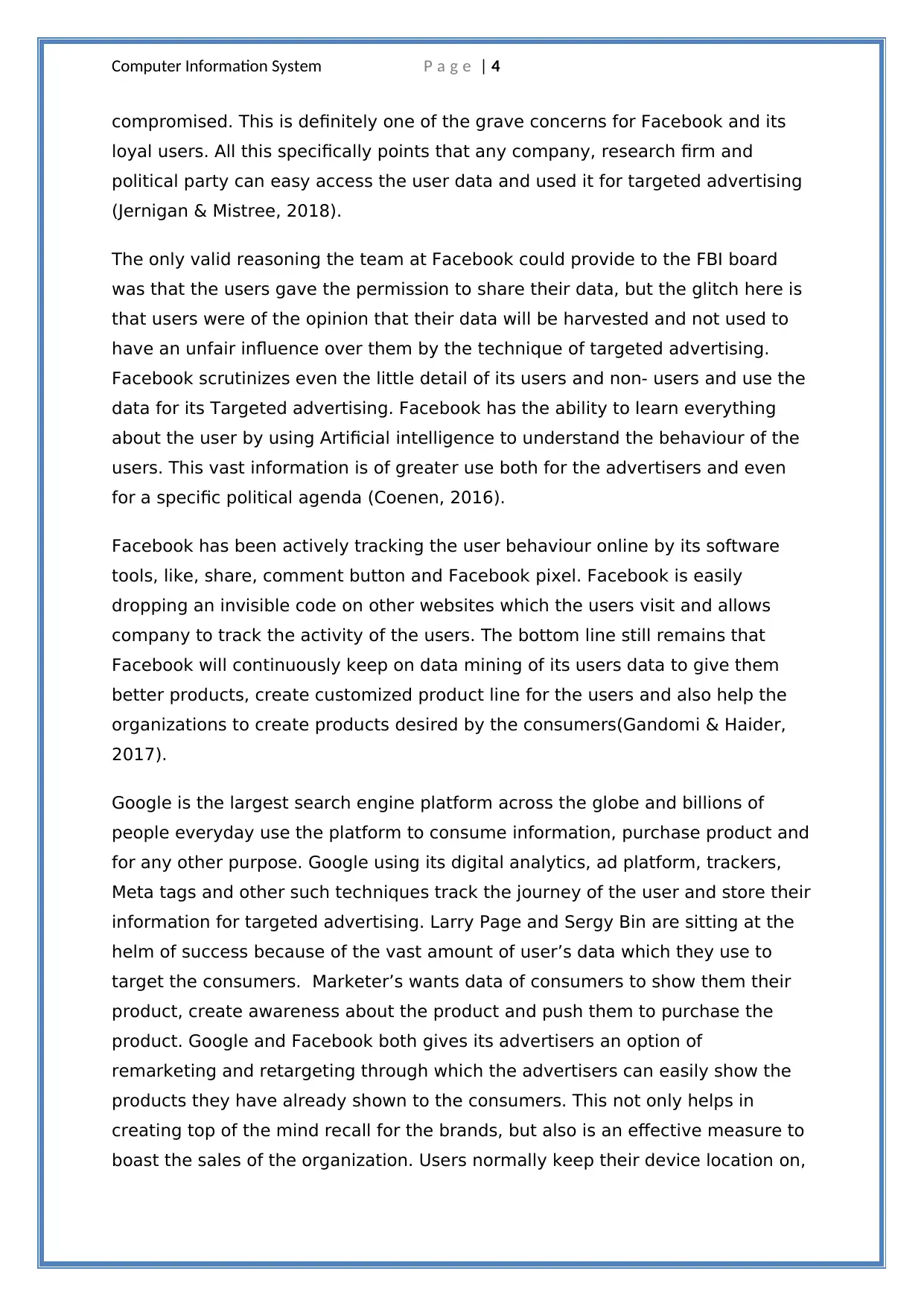
Computer Information System P a g e | 4
compromised. This is definitely one of the grave concerns for Facebook and its
loyal users. All this specifically points that any company, research firm and
political party can easy access the user data and used it for targeted advertising
(Jernigan & Mistree, 2018).
The only valid reasoning the team at Facebook could provide to the FBI board
was that the users gave the permission to share their data, but the glitch here is
that users were of the opinion that their data will be harvested and not used to
have an unfair influence over them by the technique of targeted advertising.
Facebook scrutinizes even the little detail of its users and non- users and use the
data for its Targeted advertising. Facebook has the ability to learn everything
about the user by using Artificial intelligence to understand the behaviour of the
users. This vast information is of greater use both for the advertisers and even
for a specific political agenda (Coenen, 2016).
Facebook has been actively tracking the user behaviour online by its software
tools, like, share, comment button and Facebook pixel. Facebook is easily
dropping an invisible code on other websites which the users visit and allows
company to track the activity of the users. The bottom line still remains that
Facebook will continuously keep on data mining of its users data to give them
better products, create customized product line for the users and also help the
organizations to create products desired by the consumers(Gandomi & Haider,
2017).
Google is the largest search engine platform across the globe and billions of
people everyday use the platform to consume information, purchase product and
for any other purpose. Google using its digital analytics, ad platform, trackers,
Meta tags and other such techniques track the journey of the user and store their
information for targeted advertising. Larry Page and Sergy Bin are sitting at the
helm of success because of the vast amount of user’s data which they use to
target the consumers. Marketer’s wants data of consumers to show them their
product, create awareness about the product and push them to purchase the
product. Google and Facebook both gives its advertisers an option of
remarketing and retargeting through which the advertisers can easily show the
products they have already shown to the consumers. This not only helps in
creating top of the mind recall for the brands, but also is an effective measure to
boast the sales of the organization. Users normally keep their device location on,
compromised. This is definitely one of the grave concerns for Facebook and its
loyal users. All this specifically points that any company, research firm and
political party can easy access the user data and used it for targeted advertising
(Jernigan & Mistree, 2018).
The only valid reasoning the team at Facebook could provide to the FBI board
was that the users gave the permission to share their data, but the glitch here is
that users were of the opinion that their data will be harvested and not used to
have an unfair influence over them by the technique of targeted advertising.
Facebook scrutinizes even the little detail of its users and non- users and use the
data for its Targeted advertising. Facebook has the ability to learn everything
about the user by using Artificial intelligence to understand the behaviour of the
users. This vast information is of greater use both for the advertisers and even
for a specific political agenda (Coenen, 2016).
Facebook has been actively tracking the user behaviour online by its software
tools, like, share, comment button and Facebook pixel. Facebook is easily
dropping an invisible code on other websites which the users visit and allows
company to track the activity of the users. The bottom line still remains that
Facebook will continuously keep on data mining of its users data to give them
better products, create customized product line for the users and also help the
organizations to create products desired by the consumers(Gandomi & Haider,
2017).
Google is the largest search engine platform across the globe and billions of
people everyday use the platform to consume information, purchase product and
for any other purpose. Google using its digital analytics, ad platform, trackers,
Meta tags and other such techniques track the journey of the user and store their
information for targeted advertising. Larry Page and Sergy Bin are sitting at the
helm of success because of the vast amount of user’s data which they use to
target the consumers. Marketer’s wants data of consumers to show them their
product, create awareness about the product and push them to purchase the
product. Google and Facebook both gives its advertisers an option of
remarketing and retargeting through which the advertisers can easily show the
products they have already shown to the consumers. This not only helps in
creating top of the mind recall for the brands, but also is an effective measure to
boast the sales of the organization. Users normally keep their device location on,
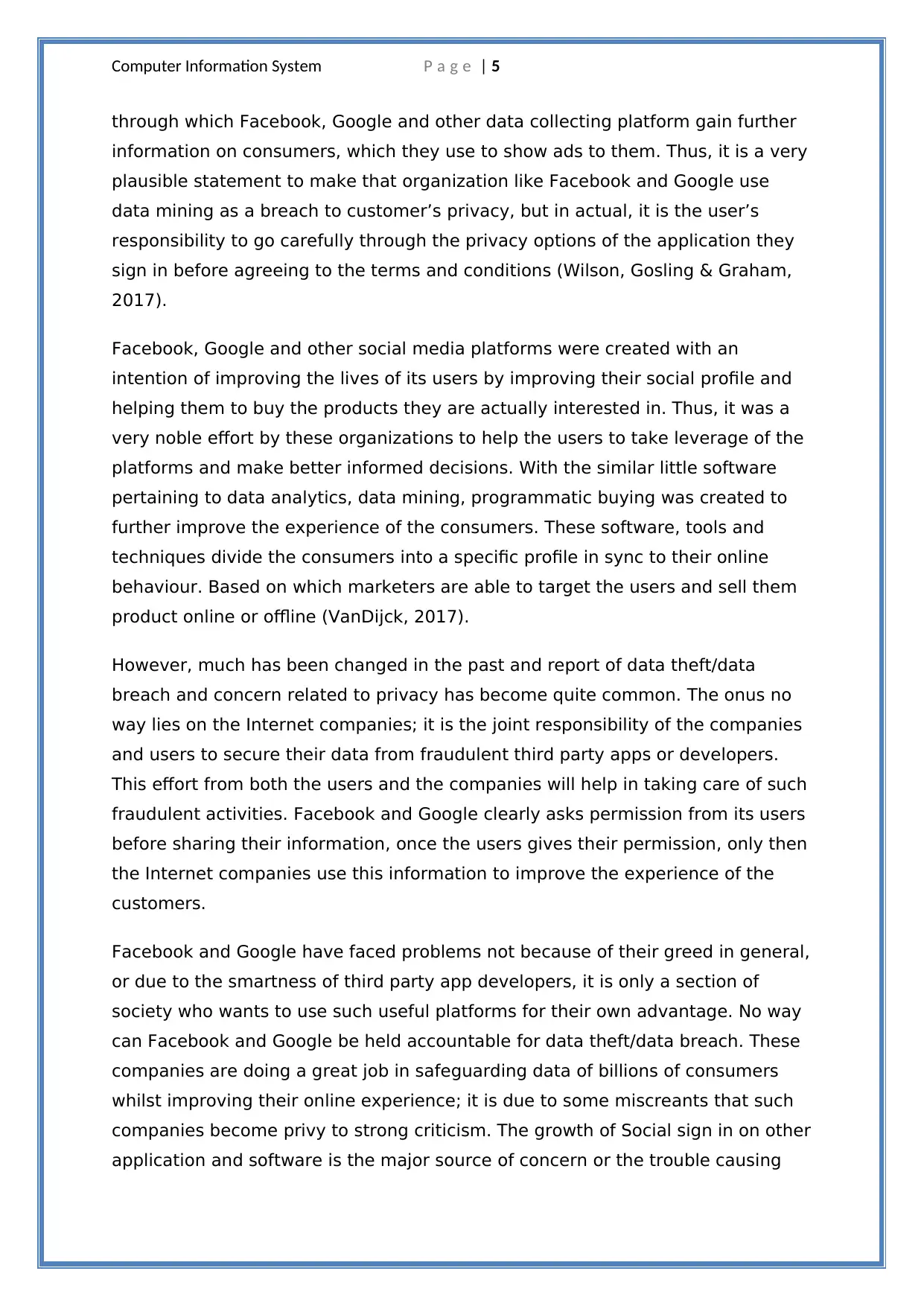
Computer Information System P a g e | 5
through which Facebook, Google and other data collecting platform gain further
information on consumers, which they use to show ads to them. Thus, it is a very
plausible statement to make that organization like Facebook and Google use
data mining as a breach to customer’s privacy, but in actual, it is the user’s
responsibility to go carefully through the privacy options of the application they
sign in before agreeing to the terms and conditions (Wilson, Gosling & Graham,
2017).
Facebook, Google and other social media platforms were created with an
intention of improving the lives of its users by improving their social profile and
helping them to buy the products they are actually interested in. Thus, it was a
very noble effort by these organizations to help the users to take leverage of the
platforms and make better informed decisions. With the similar little software
pertaining to data analytics, data mining, programmatic buying was created to
further improve the experience of the consumers. These software, tools and
techniques divide the consumers into a specific profile in sync to their online
behaviour. Based on which marketers are able to target the users and sell them
product online or offline (VanDijck, 2017).
However, much has been changed in the past and report of data theft/data
breach and concern related to privacy has become quite common. The onus no
way lies on the Internet companies; it is the joint responsibility of the companies
and users to secure their data from fraudulent third party apps or developers.
This effort from both the users and the companies will help in taking care of such
fraudulent activities. Facebook and Google clearly asks permission from its users
before sharing their information, once the users gives their permission, only then
the Internet companies use this information to improve the experience of the
customers.
Facebook and Google have faced problems not because of their greed in general,
or due to the smartness of third party app developers, it is only a section of
society who wants to use such useful platforms for their own advantage. No way
can Facebook and Google be held accountable for data theft/data breach. These
companies are doing a great job in safeguarding data of billions of consumers
whilst improving their online experience; it is due to some miscreants that such
companies become privy to strong criticism. The growth of Social sign in on other
application and software is the major source of concern or the trouble causing
through which Facebook, Google and other data collecting platform gain further
information on consumers, which they use to show ads to them. Thus, it is a very
plausible statement to make that organization like Facebook and Google use
data mining as a breach to customer’s privacy, but in actual, it is the user’s
responsibility to go carefully through the privacy options of the application they
sign in before agreeing to the terms and conditions (Wilson, Gosling & Graham,
2017).
Facebook, Google and other social media platforms were created with an
intention of improving the lives of its users by improving their social profile and
helping them to buy the products they are actually interested in. Thus, it was a
very noble effort by these organizations to help the users to take leverage of the
platforms and make better informed decisions. With the similar little software
pertaining to data analytics, data mining, programmatic buying was created to
further improve the experience of the consumers. These software, tools and
techniques divide the consumers into a specific profile in sync to their online
behaviour. Based on which marketers are able to target the users and sell them
product online or offline (VanDijck, 2017).
However, much has been changed in the past and report of data theft/data
breach and concern related to privacy has become quite common. The onus no
way lies on the Internet companies; it is the joint responsibility of the companies
and users to secure their data from fraudulent third party apps or developers.
This effort from both the users and the companies will help in taking care of such
fraudulent activities. Facebook and Google clearly asks permission from its users
before sharing their information, once the users gives their permission, only then
the Internet companies use this information to improve the experience of the
customers.
Facebook and Google have faced problems not because of their greed in general,
or due to the smartness of third party app developers, it is only a section of
society who wants to use such useful platforms for their own advantage. No way
can Facebook and Google be held accountable for data theft/data breach. These
companies are doing a great job in safeguarding data of billions of consumers
whilst improving their online experience; it is due to some miscreants that such
companies become privy to strong criticism. The growth of Social sign in on other
application and software is the major source of concern or the trouble causing
⊘ This is a preview!⊘
Do you want full access?
Subscribe today to unlock all pages.

Trusted by 1+ million students worldwide
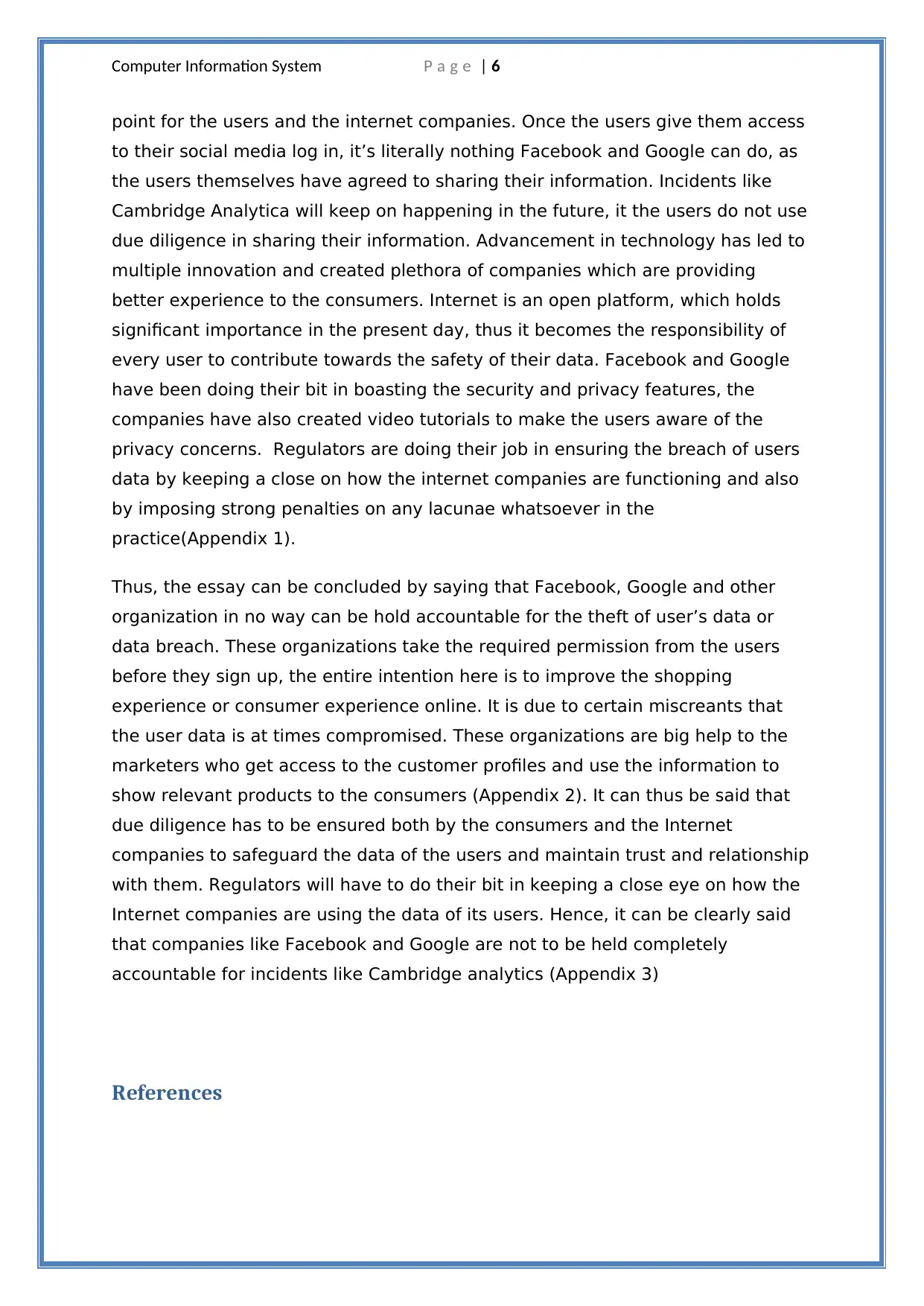
Computer Information System P a g e | 6
point for the users and the internet companies. Once the users give them access
to their social media log in, it’s literally nothing Facebook and Google can do, as
the users themselves have agreed to sharing their information. Incidents like
Cambridge Analytica will keep on happening in the future, it the users do not use
due diligence in sharing their information. Advancement in technology has led to
multiple innovation and created plethora of companies which are providing
better experience to the consumers. Internet is an open platform, which holds
significant importance in the present day, thus it becomes the responsibility of
every user to contribute towards the safety of their data. Facebook and Google
have been doing their bit in boasting the security and privacy features, the
companies have also created video tutorials to make the users aware of the
privacy concerns. Regulators are doing their job in ensuring the breach of users
data by keeping a close on how the internet companies are functioning and also
by imposing strong penalties on any lacunae whatsoever in the
practice(Appendix 1).
Thus, the essay can be concluded by saying that Facebook, Google and other
organization in no way can be hold accountable for the theft of user’s data or
data breach. These organizations take the required permission from the users
before they sign up, the entire intention here is to improve the shopping
experience or consumer experience online. It is due to certain miscreants that
the user data is at times compromised. These organizations are big help to the
marketers who get access to the customer profiles and use the information to
show relevant products to the consumers (Appendix 2). It can thus be said that
due diligence has to be ensured both by the consumers and the Internet
companies to safeguard the data of the users and maintain trust and relationship
with them. Regulators will have to do their bit in keeping a close eye on how the
Internet companies are using the data of its users. Hence, it can be clearly said
that companies like Facebook and Google are not to be held completely
accountable for incidents like Cambridge analytics (Appendix 3)
References
point for the users and the internet companies. Once the users give them access
to their social media log in, it’s literally nothing Facebook and Google can do, as
the users themselves have agreed to sharing their information. Incidents like
Cambridge Analytica will keep on happening in the future, it the users do not use
due diligence in sharing their information. Advancement in technology has led to
multiple innovation and created plethora of companies which are providing
better experience to the consumers. Internet is an open platform, which holds
significant importance in the present day, thus it becomes the responsibility of
every user to contribute towards the safety of their data. Facebook and Google
have been doing their bit in boasting the security and privacy features, the
companies have also created video tutorials to make the users aware of the
privacy concerns. Regulators are doing their job in ensuring the breach of users
data by keeping a close on how the internet companies are functioning and also
by imposing strong penalties on any lacunae whatsoever in the
practice(Appendix 1).
Thus, the essay can be concluded by saying that Facebook, Google and other
organization in no way can be hold accountable for the theft of user’s data or
data breach. These organizations take the required permission from the users
before they sign up, the entire intention here is to improve the shopping
experience or consumer experience online. It is due to certain miscreants that
the user data is at times compromised. These organizations are big help to the
marketers who get access to the customer profiles and use the information to
show relevant products to the consumers (Appendix 2). It can thus be said that
due diligence has to be ensured both by the consumers and the Internet
companies to safeguard the data of the users and maintain trust and relationship
with them. Regulators will have to do their bit in keeping a close eye on how the
Internet companies are using the data of its users. Hence, it can be clearly said
that companies like Facebook and Google are not to be held completely
accountable for incidents like Cambridge analytics (Appendix 3)
References
Paraphrase This Document
Need a fresh take? Get an instant paraphrase of this document with our AI Paraphraser
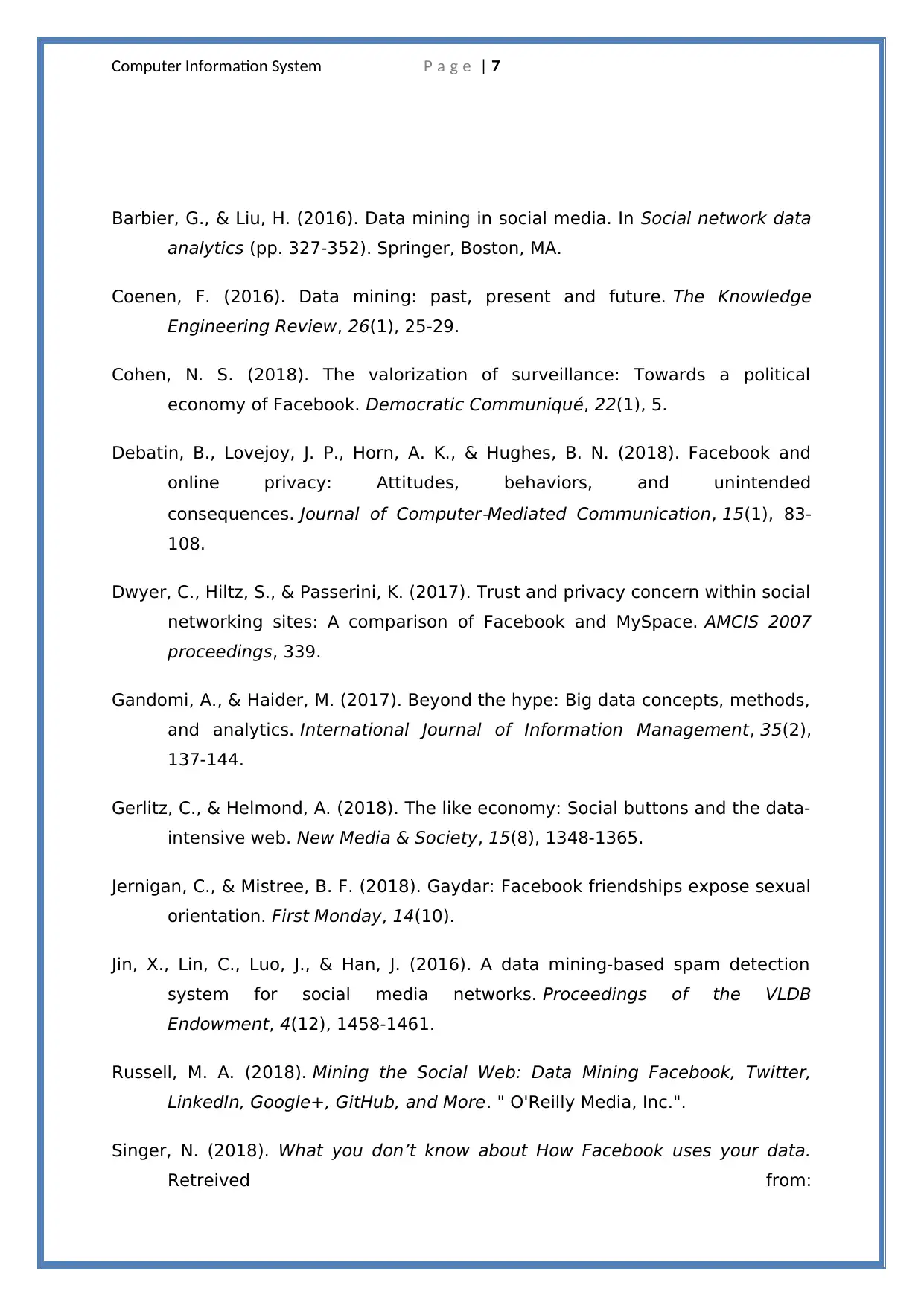
Computer Information System P a g e | 7
Barbier, G., & Liu, H. (2016). Data mining in social media. In Social network data
analytics (pp. 327-352). Springer, Boston, MA.
Coenen, F. (2016). Data mining: past, present and future. The Knowledge
Engineering Review, 26(1), 25-29.
Cohen, N. S. (2018). The valorization of surveillance: Towards a political
economy of Facebook. Democratic Communiqué, 22(1), 5.
Debatin, B., Lovejoy, J. P., Horn, A. K., & Hughes, B. N. (2018). Facebook and
online privacy: Attitudes, behaviors, and unintended
consequences. Journal of Computer
‐Mediated Communication, 15(1), 83-
108.
Dwyer, C., Hiltz, S., & Passerini, K. (2017). Trust and privacy concern within social
networking sites: A comparison of Facebook and MySpace. AMCIS 2007
proceedings, 339.
Gandomi, A., & Haider, M. (2017). Beyond the hype: Big data concepts, methods,
and analytics. International Journal of Information Management, 35(2),
137-144.
Gerlitz, C., & Helmond, A. (2018). The like economy: Social buttons and the data-
intensive web. New Media & Society, 15(8), 1348-1365.
Jernigan, C., & Mistree, B. F. (2018). Gaydar: Facebook friendships expose sexual
orientation. First Monday, 14(10).
Jin, X., Lin, C., Luo, J., & Han, J. (2016). A data mining-based spam detection
system for social media networks. Proceedings of the VLDB
Endowment, 4(12), 1458-1461.
Russell, M. A. (2018). Mining the Social Web: Data Mining Facebook, Twitter,
LinkedIn, Google+, GitHub, and More. " O'Reilly Media, Inc.".
Singer, N. (2018). What you don’t know about How Facebook uses your data.
Retreived from:
Barbier, G., & Liu, H. (2016). Data mining in social media. In Social network data
analytics (pp. 327-352). Springer, Boston, MA.
Coenen, F. (2016). Data mining: past, present and future. The Knowledge
Engineering Review, 26(1), 25-29.
Cohen, N. S. (2018). The valorization of surveillance: Towards a political
economy of Facebook. Democratic Communiqué, 22(1), 5.
Debatin, B., Lovejoy, J. P., Horn, A. K., & Hughes, B. N. (2018). Facebook and
online privacy: Attitudes, behaviors, and unintended
consequences. Journal of Computer
‐Mediated Communication, 15(1), 83-
108.
Dwyer, C., Hiltz, S., & Passerini, K. (2017). Trust and privacy concern within social
networking sites: A comparison of Facebook and MySpace. AMCIS 2007
proceedings, 339.
Gandomi, A., & Haider, M. (2017). Beyond the hype: Big data concepts, methods,
and analytics. International Journal of Information Management, 35(2),
137-144.
Gerlitz, C., & Helmond, A. (2018). The like economy: Social buttons and the data-
intensive web. New Media & Society, 15(8), 1348-1365.
Jernigan, C., & Mistree, B. F. (2018). Gaydar: Facebook friendships expose sexual
orientation. First Monday, 14(10).
Jin, X., Lin, C., Luo, J., & Han, J. (2016). A data mining-based spam detection
system for social media networks. Proceedings of the VLDB
Endowment, 4(12), 1458-1461.
Russell, M. A. (2018). Mining the Social Web: Data Mining Facebook, Twitter,
LinkedIn, Google+, GitHub, and More. " O'Reilly Media, Inc.".
Singer, N. (2018). What you don’t know about How Facebook uses your data.
Retreived from:
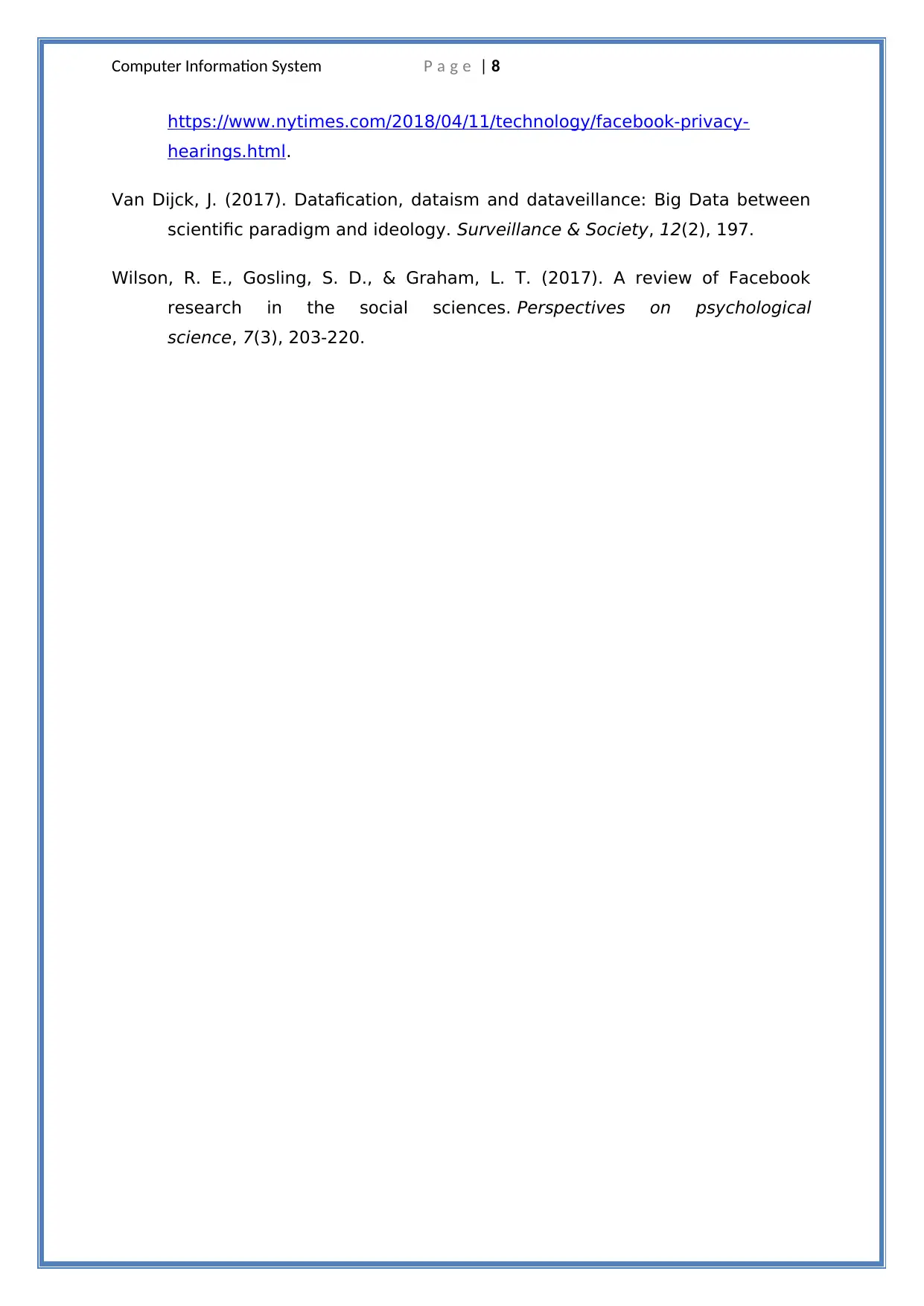
Computer Information System P a g e | 8
https://www.nytimes.com/2018/04/11/technology/facebook-privacy-
hearings.html.
Van Dijck, J. (2017). Datafication, dataism and dataveillance: Big Data between
scientific paradigm and ideology. Surveillance & Society, 12(2), 197.
Wilson, R. E., Gosling, S. D., & Graham, L. T. (2017). A review of Facebook
research in the social sciences. Perspectives on psychological
science, 7(3), 203-220.
https://www.nytimes.com/2018/04/11/technology/facebook-privacy-
hearings.html.
Van Dijck, J. (2017). Datafication, dataism and dataveillance: Big Data between
scientific paradigm and ideology. Surveillance & Society, 12(2), 197.
Wilson, R. E., Gosling, S. D., & Graham, L. T. (2017). A review of Facebook
research in the social sciences. Perspectives on psychological
science, 7(3), 203-220.
⊘ This is a preview!⊘
Do you want full access?
Subscribe today to unlock all pages.

Trusted by 1+ million students worldwide
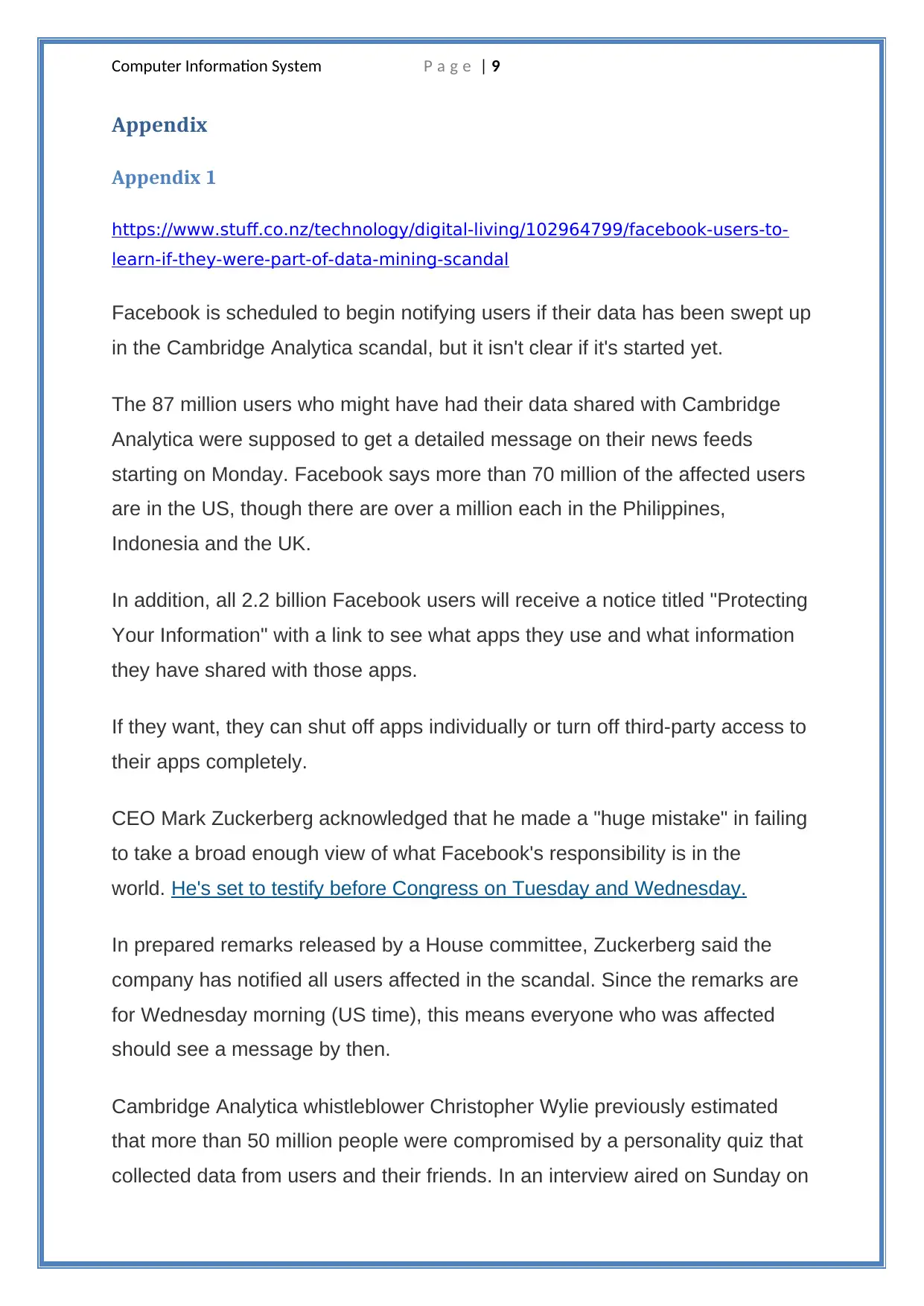
Computer Information System P a g e | 9
Appendix
Appendix 1
https://www.stuff.co.nz/technology/digital-living/102964799/facebook-users-to-
learn-if-they-were-part-of-data-mining-scandal
Facebook is scheduled to begin notifying users if their data has been swept up
in the Cambridge Analytica scandal, but it isn't clear if it's started yet.
The 87 million users who might have had their data shared with Cambridge
Analytica were supposed to get a detailed message on their news feeds
starting on Monday. Facebook says more than 70 million of the affected users
are in the US, though there are over a million each in the Philippines,
Indonesia and the UK.
In addition, all 2.2 billion Facebook users will receive a notice titled "Protecting
Your Information" with a link to see what apps they use and what information
they have shared with those apps.
If they want, they can shut off apps individually or turn off third-party access to
their apps completely.
CEO Mark Zuckerberg acknowledged that he made a "huge mistake" in failing
to take a broad enough view of what Facebook's responsibility is in the
world. He's set to testify before Congress on Tuesday and Wednesday.
In prepared remarks released by a House committee, Zuckerberg said the
company has notified all users affected in the scandal. Since the remarks are
for Wednesday morning (US time), this means everyone who was affected
should see a message by then.
Cambridge Analytica whistleblower Christopher Wylie previously estimated
that more than 50 million people were compromised by a personality quiz that
collected data from users and their friends. In an interview aired on Sunday on
Appendix
Appendix 1
https://www.stuff.co.nz/technology/digital-living/102964799/facebook-users-to-
learn-if-they-were-part-of-data-mining-scandal
Facebook is scheduled to begin notifying users if their data has been swept up
in the Cambridge Analytica scandal, but it isn't clear if it's started yet.
The 87 million users who might have had their data shared with Cambridge
Analytica were supposed to get a detailed message on their news feeds
starting on Monday. Facebook says more than 70 million of the affected users
are in the US, though there are over a million each in the Philippines,
Indonesia and the UK.
In addition, all 2.2 billion Facebook users will receive a notice titled "Protecting
Your Information" with a link to see what apps they use and what information
they have shared with those apps.
If they want, they can shut off apps individually or turn off third-party access to
their apps completely.
CEO Mark Zuckerberg acknowledged that he made a "huge mistake" in failing
to take a broad enough view of what Facebook's responsibility is in the
world. He's set to testify before Congress on Tuesday and Wednesday.
In prepared remarks released by a House committee, Zuckerberg said the
company has notified all users affected in the scandal. Since the remarks are
for Wednesday morning (US time), this means everyone who was affected
should see a message by then.
Cambridge Analytica whistleblower Christopher Wylie previously estimated
that more than 50 million people were compromised by a personality quiz that
collected data from users and their friends. In an interview aired on Sunday on
Paraphrase This Document
Need a fresh take? Get an instant paraphrase of this document with our AI Paraphraser
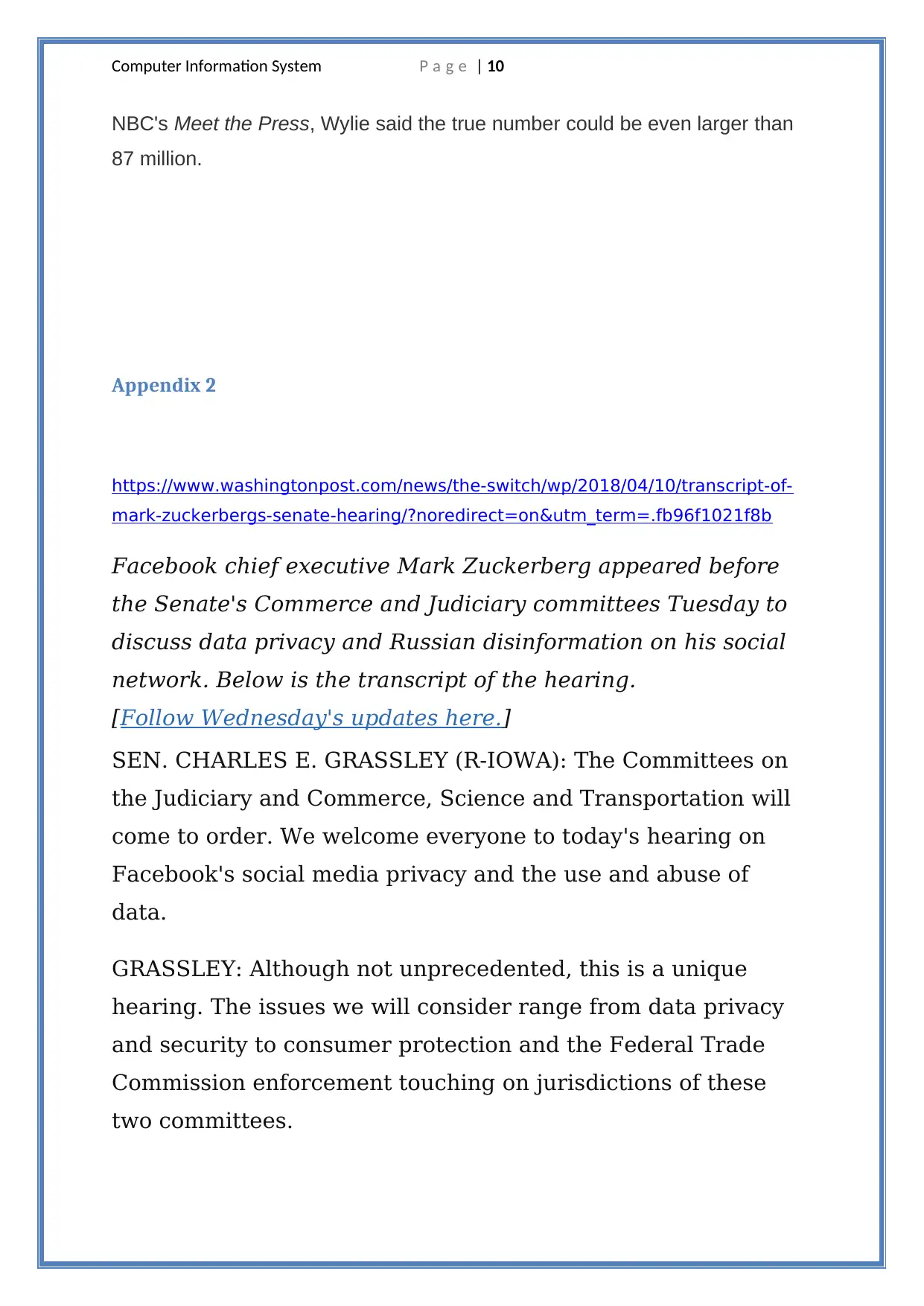
Computer Information System P a g e | 10
NBC's Meet the Press, Wylie said the true number could be even larger than
87 million.
Appendix 2
https://www.washingtonpost.com/news/the-switch/wp/2018/04/10/transcript-of-
mark-zuckerbergs-senate-hearing/?noredirect=on&utm_term=.fb96f1021f8b
Facebook chief executive Mark Zuckerberg appeared before
the Senate's Commerce and Judiciary committees Tuesday to
discuss data privacy and Russian disinformation on his social
network. Below is the transcript of the hearing.
[Follow Wednesday's updates here.]
SEN. CHARLES E. GRASSLEY (R-IOWA): The Committees on
the Judiciary and Commerce, Science and Transportation will
come to order. We welcome everyone to today's hearing on
Facebook's social media privacy and the use and abuse of
data.
GRASSLEY: Although not unprecedented, this is a unique
hearing. The issues we will consider range from data privacy
and security to consumer protection and the Federal Trade
Commission enforcement touching on jurisdictions of these
two committees.
NBC's Meet the Press, Wylie said the true number could be even larger than
87 million.
Appendix 2
https://www.washingtonpost.com/news/the-switch/wp/2018/04/10/transcript-of-
mark-zuckerbergs-senate-hearing/?noredirect=on&utm_term=.fb96f1021f8b
Facebook chief executive Mark Zuckerberg appeared before
the Senate's Commerce and Judiciary committees Tuesday to
discuss data privacy and Russian disinformation on his social
network. Below is the transcript of the hearing.
[Follow Wednesday's updates here.]
SEN. CHARLES E. GRASSLEY (R-IOWA): The Committees on
the Judiciary and Commerce, Science and Transportation will
come to order. We welcome everyone to today's hearing on
Facebook's social media privacy and the use and abuse of
data.
GRASSLEY: Although not unprecedented, this is a unique
hearing. The issues we will consider range from data privacy
and security to consumer protection and the Federal Trade
Commission enforcement touching on jurisdictions of these
two committees.
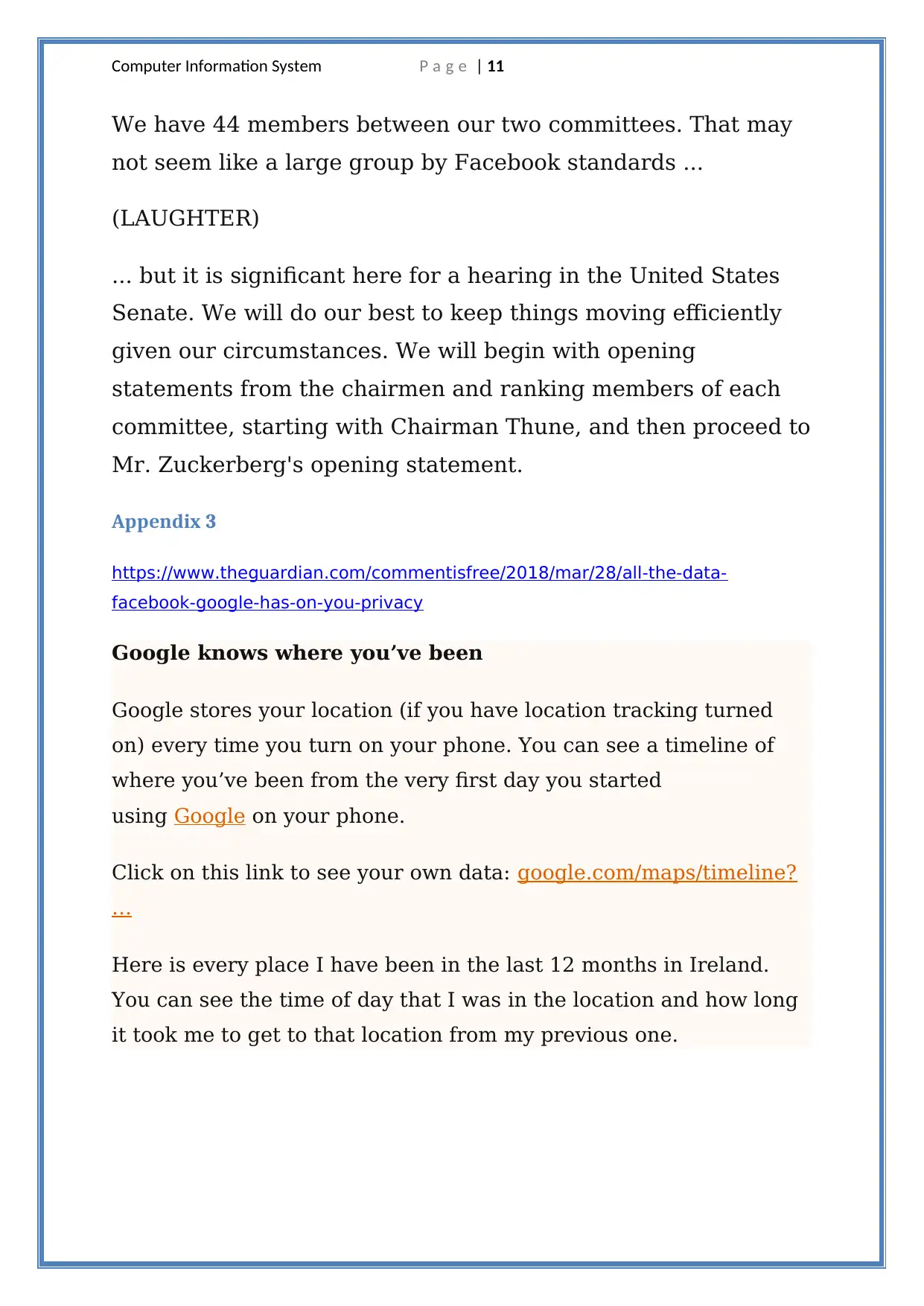
Computer Information System P a g e | 11
We have 44 members between our two committees. That may
not seem like a large group by Facebook standards ...
(LAUGHTER)
... but it is significant here for a hearing in the United States
Senate. We will do our best to keep things moving efficiently
given our circumstances. We will begin with opening
statements from the chairmen and ranking members of each
committee, starting with Chairman Thune, and then proceed to
Mr. Zuckerberg's opening statement.
Appendix 3
https://www.theguardian.com/commentisfree/2018/mar/28/all-the-data-
facebook-google-has-on-you-privacy
Google knows where you’ve been
Google stores your location (if you have location tracking turned
on) every time you turn on your phone. You can see a timeline of
where you’ve been from the very first day you started
using Google on your phone.
Click on this link to see your own data: google.com/maps/timeline?
…
Here is every place I have been in the last 12 months in Ireland.
You can see the time of day that I was in the location and how long
it took me to get to that location from my previous one.
We have 44 members between our two committees. That may
not seem like a large group by Facebook standards ...
(LAUGHTER)
... but it is significant here for a hearing in the United States
Senate. We will do our best to keep things moving efficiently
given our circumstances. We will begin with opening
statements from the chairmen and ranking members of each
committee, starting with Chairman Thune, and then proceed to
Mr. Zuckerberg's opening statement.
Appendix 3
https://www.theguardian.com/commentisfree/2018/mar/28/all-the-data-
facebook-google-has-on-you-privacy
Google knows where you’ve been
Google stores your location (if you have location tracking turned
on) every time you turn on your phone. You can see a timeline of
where you’ve been from the very first day you started
using Google on your phone.
Click on this link to see your own data: google.com/maps/timeline?
…
Here is every place I have been in the last 12 months in Ireland.
You can see the time of day that I was in the location and how long
it took me to get to that location from my previous one.
⊘ This is a preview!⊘
Do you want full access?
Subscribe today to unlock all pages.

Trusted by 1+ million students worldwide
1 out of 16
Related Documents
Your All-in-One AI-Powered Toolkit for Academic Success.
+13062052269
info@desklib.com
Available 24*7 on WhatsApp / Email
![[object Object]](/_next/static/media/star-bottom.7253800d.svg)
Unlock your academic potential
Copyright © 2020–2026 A2Z Services. All Rights Reserved. Developed and managed by ZUCOL.





